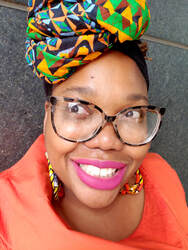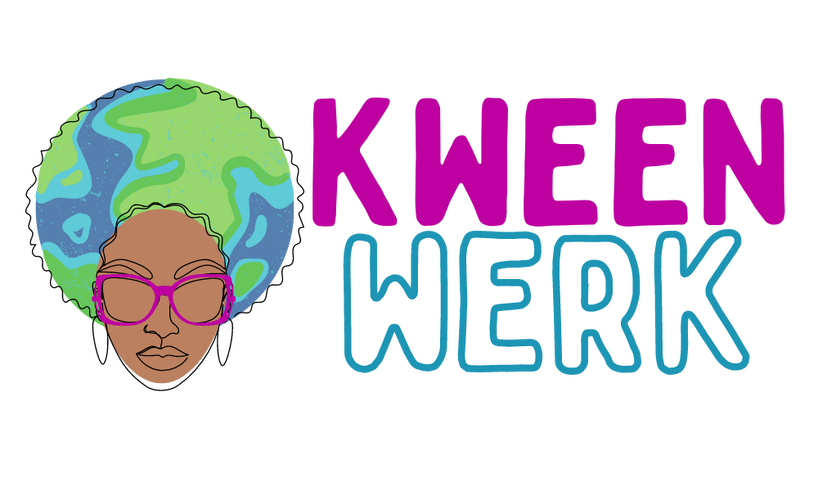KWEEN WERK is a Justice, Equity, Diversity & Inclusion Strategist | Trainer | Speaker | Artist | Consultant
Parker is available to conduct presentations, educational sessions or training workshops virtually or at your location, workshop or conference.
Parker is available to conduct presentations, educational sessions or training workshops virtually or at your location, workshop or conference.

Parker is a dynamic speaker that engages audiences in new thinking around what it means to be a diversity change-agent. Parker’s background in the conservation, environmental education and outdoor recreation fields spans over 24+ years. Parker has a passion for equity and inclusion in the outdoors. Her interest in justice, accessibility, and equity issues developed from her personal experiences facing the unequal representation of people of color in environmental organizations and green spaces. Parker tackles these complex issues by addressing them through head on activism and education. In Colorado she works with environmental organizations to aid them in building culturally diverse and culturally competent organizations that are representative of the populations that they hope to reach and serve. She is a member of several committees that focus on diversity in environmental fields as well as a presenter and trainer on diversity issues. Parker is the creator of the Training and Consulting firm called Ecoinclusive. Parker McMullen Bushman is also the Co-founder of Inclusive Journeys. Inclusive Journeys is a company that is working to identify safe and welcoming spaces for all. Their first project is the Digital Green Book.
Workshop/Presentation Examples
These are examples of a few of the dynamic workshops Parker offers.
WHY DIVERSITY, EQUITY AND INCLUSION IS VITAL TO CONSERVATION GOALS
Why Diversity, Equity, and Inclusion? Diversity, equity, and inclusion have become buzzwords that have been placed strategically in organizational mandates, inspired the formation of DEI committees, and/or simply sparked critical dialogue around organizational culture. But do we know what these words really mean and how do we put this work into action in the environmental field. In this session participants will learn about the history of inclusion in public lands, how we incorporate DEI principles into our work and the importance of creating welcoming spaces so that all people may become environmental stewards who will advocate for and protect our most precious public resources – our land, water, trees, open spaces and wildlife.
ENVIRONMENTAL JUSTICE IN YOUR COMMUNITY
Do you know what environmental justice is, or how environmental hazards affects different communities? Did you know that often times the zip-code of where you live is an indicator of your lifespan and general health?m This workshop will introduce participants to the environmental justice (EJ) movement. This will include a lecture on, and discussion of, the connections between socio-cultural inequity and environmental issues and a brief history of the EJ movement.
EXAMINING UNCONSCIOUS BIAS
We all bring unconscious biases into the workplace. These deeply subconscious attitudes span race, gender, appearance, age, wealth and much more. They influence everything from the neighborhood you live in, to the employee you promote and the one you don’t. These biases are reflexively triggered without our knowledge, they are virtually unnoticeable. Our unconscious biases are hidden. Although we are unaware of them they influence our beliefs about and behavior toward others. This workshop focuses on the implicit attitudes or stereotypes that shape how we engage others and make decisions in the workplace.
4 I’S OF OPPRESSION
The combination of prejudice and institutional power can create systems that discriminates against some groups and benefits other groups. These systems enable dominant groups to exert control over target groups by limiting their rights, freedom, and access to basic resources such as health care, education, employment, and housing. Systemic oppression manifests on the individual, the interpersonal, the institutional, and the structural level. In this class we will examine the 4 I’s of oppression and how they are at play in our organization.
UNDERSTANDING PRIVILEGE & POWER
Understanding privilege is a key component to anti-oppression work. This workshop explains privilege and how it operates. We will also discuss microaggressions and how they reinforce privilege and undermine a culture of inclusion. Participants will have had an opportunity to discuss openly topics of race, class, ability, oppression, and power/privilege. Participants learn how to successfully navigate privilege in society and professional workspaces.
THE IMPACT OF MICROAGGRESSIONS – AN INTRODUCTORY TRAINING
Microaggressions are subtle verbal and non-verbal slights based on social group membership. Microaggressions are often the result of unconscious biases that lead to unintended discrimination against or degradation of those who are socially marginalized in a society, whether for skin color, gender, sexual orientation, age, language, origin, religion, disability, or any other characteristic. Raising our awareness of systems and bias allows us to rethink the ways in which we approach hiring, inclusion, organizational culture and relationships with stakeholders. The session provides an understanding of how privilege and bias work and ways we can disrupt microaggression patterns and have tough conversations.
VISIONING FOR EFFECTIVE ALLYSHIP – CREATING A PERSONAL WORK PLAN FOR RACIAL JUSTICE
What does it mean for white people to be effective allies to people of color in your work for racial justice?
Black and Indigenous people of color cannot solve diversity and inclusion problems alone. An ally is a person who stands up for others to proactively build inclusion in our communities, schools and workplaces. Allyship is a lifelong process of building relationships based on trust, consistency, and accountability with marginalized individuals and/or groups of people. not self-defined—work and efforts must be recognized by those you are seeking to ally with. During this workshop participants learn about all the ways they can be a stronger ally to people of color through practical and actionable steps. If you are a White identifying individual seeking to promote racial equity within your community, this workshop will equip you with tools to be an active ally for racial justice through methods like naming white privilege, centering people of color, understanding systems of oppression, and continuing your own self-work journey. During this workshop you will have time to speak with other allies and use critical thinking to develop your personal action plan.
Workshop/Presentation Examples
These are examples of a few of the dynamic workshops Parker offers.
WHY DIVERSITY, EQUITY AND INCLUSION IS VITAL TO CONSERVATION GOALS
Why Diversity, Equity, and Inclusion? Diversity, equity, and inclusion have become buzzwords that have been placed strategically in organizational mandates, inspired the formation of DEI committees, and/or simply sparked critical dialogue around organizational culture. But do we know what these words really mean and how do we put this work into action in the environmental field. In this session participants will learn about the history of inclusion in public lands, how we incorporate DEI principles into our work and the importance of creating welcoming spaces so that all people may become environmental stewards who will advocate for and protect our most precious public resources – our land, water, trees, open spaces and wildlife.
ENVIRONMENTAL JUSTICE IN YOUR COMMUNITY
Do you know what environmental justice is, or how environmental hazards affects different communities? Did you know that often times the zip-code of where you live is an indicator of your lifespan and general health?m This workshop will introduce participants to the environmental justice (EJ) movement. This will include a lecture on, and discussion of, the connections between socio-cultural inequity and environmental issues and a brief history of the EJ movement.
EXAMINING UNCONSCIOUS BIAS
We all bring unconscious biases into the workplace. These deeply subconscious attitudes span race, gender, appearance, age, wealth and much more. They influence everything from the neighborhood you live in, to the employee you promote and the one you don’t. These biases are reflexively triggered without our knowledge, they are virtually unnoticeable. Our unconscious biases are hidden. Although we are unaware of them they influence our beliefs about and behavior toward others. This workshop focuses on the implicit attitudes or stereotypes that shape how we engage others and make decisions in the workplace.
4 I’S OF OPPRESSION
The combination of prejudice and institutional power can create systems that discriminates against some groups and benefits other groups. These systems enable dominant groups to exert control over target groups by limiting their rights, freedom, and access to basic resources such as health care, education, employment, and housing. Systemic oppression manifests on the individual, the interpersonal, the institutional, and the structural level. In this class we will examine the 4 I’s of oppression and how they are at play in our organization.
UNDERSTANDING PRIVILEGE & POWER
Understanding privilege is a key component to anti-oppression work. This workshop explains privilege and how it operates. We will also discuss microaggressions and how they reinforce privilege and undermine a culture of inclusion. Participants will have had an opportunity to discuss openly topics of race, class, ability, oppression, and power/privilege. Participants learn how to successfully navigate privilege in society and professional workspaces.
THE IMPACT OF MICROAGGRESSIONS – AN INTRODUCTORY TRAINING
Microaggressions are subtle verbal and non-verbal slights based on social group membership. Microaggressions are often the result of unconscious biases that lead to unintended discrimination against or degradation of those who are socially marginalized in a society, whether for skin color, gender, sexual orientation, age, language, origin, religion, disability, or any other characteristic. Raising our awareness of systems and bias allows us to rethink the ways in which we approach hiring, inclusion, organizational culture and relationships with stakeholders. The session provides an understanding of how privilege and bias work and ways we can disrupt microaggression patterns and have tough conversations.
VISIONING FOR EFFECTIVE ALLYSHIP – CREATING A PERSONAL WORK PLAN FOR RACIAL JUSTICE
What does it mean for white people to be effective allies to people of color in your work for racial justice?
Black and Indigenous people of color cannot solve diversity and inclusion problems alone. An ally is a person who stands up for others to proactively build inclusion in our communities, schools and workplaces. Allyship is a lifelong process of building relationships based on trust, consistency, and accountability with marginalized individuals and/or groups of people. not self-defined—work and efforts must be recognized by those you are seeking to ally with. During this workshop participants learn about all the ways they can be a stronger ally to people of color through practical and actionable steps. If you are a White identifying individual seeking to promote racial equity within your community, this workshop will equip you with tools to be an active ally for racial justice through methods like naming white privilege, centering people of color, understanding systems of oppression, and continuing your own self-work journey. During this workshop you will have time to speak with other allies and use critical thinking to develop your personal action plan.
